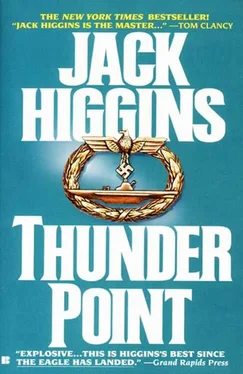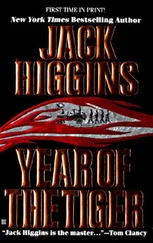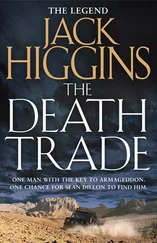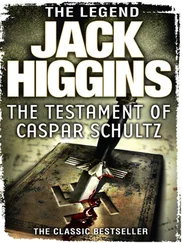Jack Higgins - Thunder Point
Здесь есть возможность читать онлайн «Jack Higgins - Thunder Point» — ознакомительный отрывок электронной книги совершенно бесплатно, а после прочтения отрывка купить полную версию. В некоторых случаях можно слушать аудио, скачать через торрент в формате fb2 и присутствует краткое содержание. Жанр: Триллер, на английском языке. Описание произведения, (предисловие) а так же отзывы посетителей доступны на портале библиотеки ЛибКат.
- Название:Thunder Point
- Автор:
- Жанр:
- Год:неизвестен
- ISBN:нет данных
- Рейтинг книги:3 / 5. Голосов: 1
-
Избранное:Добавить в избранное
- Отзывы:
-
Ваша оценка:
- 60
- 1
- 2
- 3
- 4
- 5
Thunder Point: краткое содержание, описание и аннотация
Предлагаем к чтению аннотацию, описание, краткое содержание или предисловие (зависит от того, что написал сам автор книги «Thunder Point»). Если вы не нашли необходимую информацию о книге — напишите в комментариях, мы постараемся отыскать её.
Thunder Point — читать онлайн ознакомительный отрывок
Ниже представлен текст книги, разбитый по страницам. Система сохранения места последней прочитанной страницы, позволяет с удобством читать онлайн бесплатно книгу «Thunder Point», без необходимости каждый раз заново искать на чём Вы остановились. Поставьте закладку, и сможете в любой момент перейти на страницу, на которой закончили чтение.
Интервал:
Закладка:
Both the aft and forward water-tight doors were closed, but that was standard practice when things got bad. He tried the unlocking wheel on the forward hatch, but it was immovable and hopelessly corroded. There were some oxygen bottles, even a belt of some kind of ammunition, and the most pathetic thing of all, a few human bones in the sediment of the floor. Amazing that there was any trace at all after so many years.
Suddenly he felt cold. It was as if he was an intruder who shouldn’t be here. He turned to go and his light picked out a handle in the corner, very like a suitcase handle. He reached for it, the sediment stirred and he found himself clutching a small briefcase in some kind of metal, encrusted like everything else. It was enough and he went out through the gash in the hull, drifted up over the edge of the reef and went for the anchor.
He made it with five minutes to spare. Stupid bastard, he told himself, taking such a chance, and he ascended just by the book, one foot per second, one hand sliding up the line, the briefcase in the other, leaving the line at twenty feet to swim under the boat and surface at the stern.
He pushed the briefcase on board, then wriggled out of his equipment, which was always the worst part. You’re getting old, Henry, he told himself as he scrambled up the ladder and turned to heave his buoyancy jacket and tank on board.
He schooled himself to do everything as normal, stowing away the tank and the equipment following his usual routine. He toweled himself dry, changed into jeans and a fresh denim shirt, all the time ignoring the briefcase. He opened his thermos and poured some coffee, then went and sat in one of the swivel chairs in the stern, drinking and staring at the briefcase encrusted with coral.
The encrusting was superficial more than anything else. He got a wire brush from his tool kit and applied it vigorously and realized at once that the case was made of aluminium. As the surface cleared, the Eagle and Swastika of the German Kriegsmarine was revealed etched into the top right-hand corner. It was secured by two clips and there was a lock. The clips came up easily enough, but the lid remained obstinately down, obviously locked, which left him little choice. He found a large screwdriver, forced it in just above the lock and was able to prize open the lid within a few moments. The inside was totally dry, the contents a few photos and several letters bound together by a rubber band. There was also a large diary in red Moroccan leather stamped with a Kriegsmarine insignia in gold.
The photos were of a young woman and two little girls. There was a date on the back of one of them at the start of a handwritten paragraph in German, August 8, 1944. The rest made no sense to him as he didn’t speak the language. There was also a faded snap of a man in Kriegsmarine uniform. He looked about thirty and wore a number of medals, including the Knight’s Cross at his throat. Someone special, a real ace from the look of him.
The diary was also in German. The first entry was April 30, 1945, and he recognized the name, Bergen, knew that was a port in Norway. On the flyleaf was an entry he did understand. Korvettenkapitän Paul Friemel, U180, obviously the captain and owner of this diary.
Baker flicked through the pages, totally frustrated at being unable to decipher any of it. There were some twenty-seven entries, sometimes a page for each day, sometimes more. On some occasions there was a notation to indicate position, and he had little difficulty in seeing from those entries that the voyage had taken the submarine into the Atlantic and south to the Caribbean.
The strange thing was the fact that the final entry was dated May 28, 1945, and that didn’t make too much sense. Henry Baker had been sixteen years of age when the war in Europe had ended, and he recalled the events of those days with surprising clarity. The Russians had reached Berlin and reduced it to hell on earth, and Adolf Hitler, holed up in the Führer Bunker at the Reich Chancellery, had committed suicide on May the 1st at 10:30 P.M. along with his wife of a few hours only, Eva Braun. That was the effective end of the Third Reich and capitulation had soon followed. If that were so, what in the hell was U180 doing in the Virgin Islands with a final log entry dated May 28?
If only he could speak German, and the further frustrating thing was that he didn’t know a soul in St. John who did. On the other hand, if he did, would he want to share such a secret? One thing was certain: If news of the submarine and its whereabouts got out, the place would be invaded within days.
He flicked through the pages again, paused suddenly and turned back a page. A name jumped out at him. Reichsleiter Martin Bormann . Baker’s excitement was intense. Martin Bormann, Head of the Nazi Party Chancellery and Secretary to the Führer. Had he escaped from the Bunker at the end, or had he died trying to escape from Berlin? How many books had been written about that?
He turned the page idly and another name came out at him: the Duke of Windsor . Baker sat staring at the page, his throat dry, and then he very carefully closed the diary and put it back in the case with the letter and photos. He closed the lid, put the case in the wheelhouse and started the engines. Then he went and hauled in the anchor.
Whatever it was, it was heavy, had to be. He had a U-boat that had gone down in the Virgin Islands three weeks after the end of the war in Europe, a private diary kept by the captain which mentioned the most powerful man in Nazi Germany after Hitler, and the Duke of Windsor.
“My God, what have I got into?” he murmured.
He could go to the authorities, of course, the Coast Guard, for example, but it had been his find, that was the trouble, and he was reluctant to relinquish that. But what in the hell to do next, and then it came to him and he laughed out loud.
“Garth Travers, of course,” and he pushed up to full throttle and hurried back to St. John.
In 1951 as a Lieutenant in the U.S. Navy, Baker had been assigned as liaison officer to the British Royal Navy destroyer Persephone , which was when he had first met Garth Travers, a gunnery officer. Travers was on the fast track, had taken a degree in history at Oxford University, and the two young officers had made a firm friendship, cemented by five hours in the water one dark night off the Korean coast, which they’d spent hanging on to each other after a landing craft on which they’d been making a night drop with Royal Marine Commandos had hit a mine.
And Travers had gone on to great things, had retired a Rear Admiral. Since then he’d written several books on naval aspects of the Second World War, had translated a standard work on the Kriegsmarine from the German which Baker’s publishing house had published in the last year he’d been in the business. Travers was the man, no doubt about it.
He was close inshore to St. John now and saw another Sport Fisherman bearing down on him and he recognized the Sea Raider , Bob Carney’s boat. It slowed, turning toward him, and Baker slowed too. There were four people in the stern dressed for diving, three women and a man. Bob Carney was on the flying bridge.
“Morning, Henry,” he called. “Out early. Where you been?”
“French Cap.” Baker didn’t like lying to a friend but had no choice.
“Conditions good?”
“Excellent, millpond out there.”
“Fine.” Carney smiled and waved. “Take care, Henry.”
The Sea Raider moved away and Baker pushed up to full power and headed for Cruz Bay.
When he reached the house, he knew at once that Jenny wasn’t there because the jeep had gone. He checked his watch. Ten o’clock. Something must have come up to take her out. He went into the kitchen, got a beer from the icebox and went to his study, carrying the briefcase in one hand. He placed it on the desk, pulled his phone file across and leafed through it one-handed while he drank the beer. He found what he was looking for soon enough and checked his watch again. Ten after ten, which meant ten after three in the afternoon in London. He picked up the telephone and dialed.
Читать дальшеИнтервал:
Закладка:
Похожие книги на «Thunder Point»
Представляем Вашему вниманию похожие книги на «Thunder Point» списком для выбора. Мы отобрали схожую по названию и смыслу литературу в надежде предоставить читателям больше вариантов отыскать новые, интересные, ещё непрочитанные произведения.
Обсуждение, отзывы о книге «Thunder Point» и просто собственные мнения читателей. Оставьте ваши комментарии, напишите, что Вы думаете о произведении, его смысле или главных героях. Укажите что конкретно понравилось, а что нет, и почему Вы так считаете.












